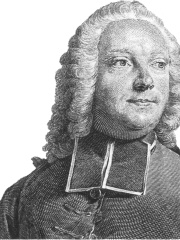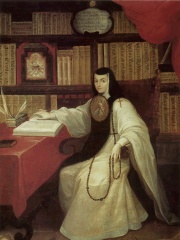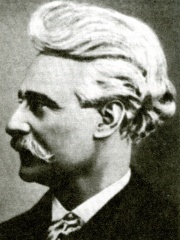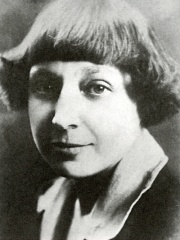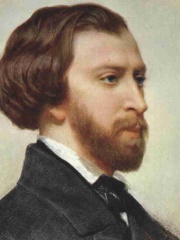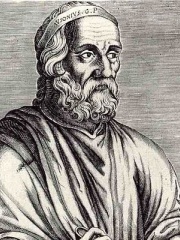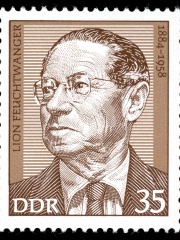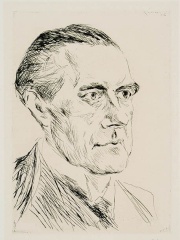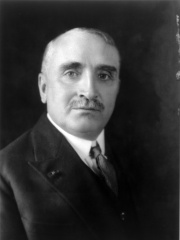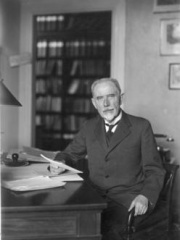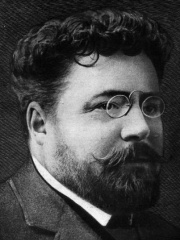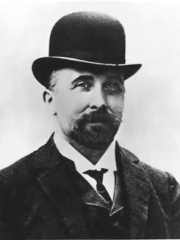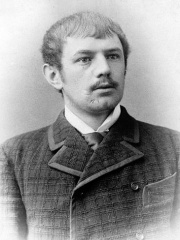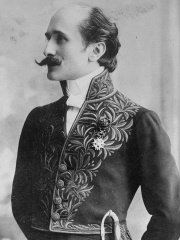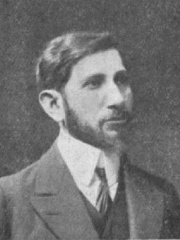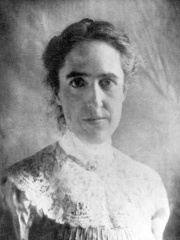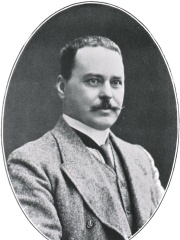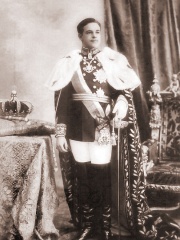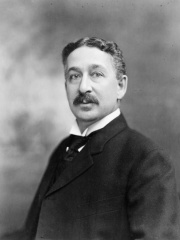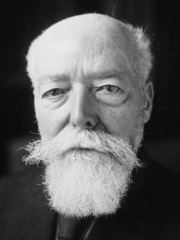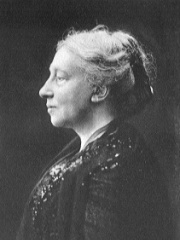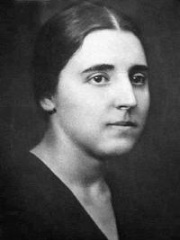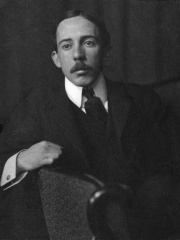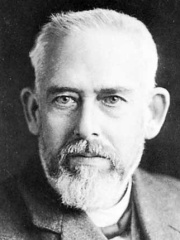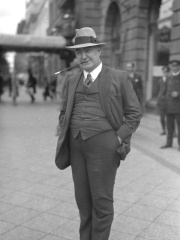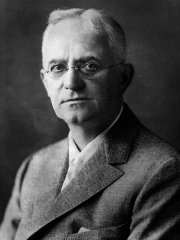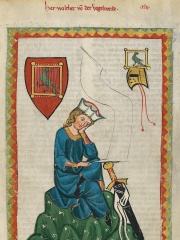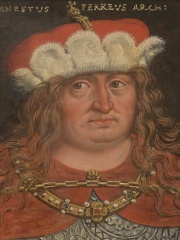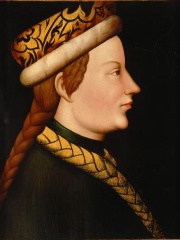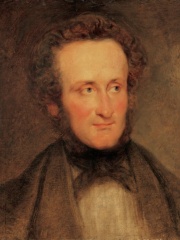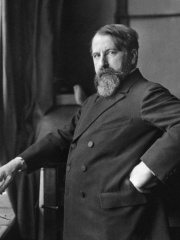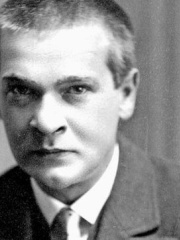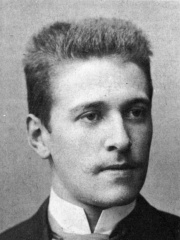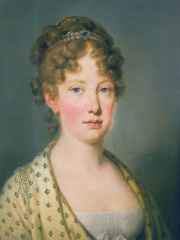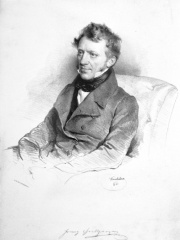WRITER
Gustav Meyrink
1868 - 1932
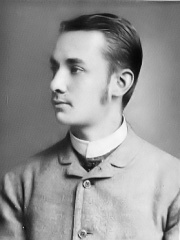
 Gustav Meyrink
Gustav Meyrink
Gustav Meyrink (19 January 1868 – 4 December 1932) was the pseudonym of Gustav Meyer, an Austrian author, novelist, dramatist, translator, and banker, most famous for his novel The Golem. He has been described as the "most respected German language writer in the field of supernatural fiction". Read more on Wikipedia
His biography is available in 41 different languages on Wikipedia (up from 40 in 2024). Gustav Meyrink is the 599th most popular writer (down from 546th in 2024), the 145th most popular biography from Austria (down from 125th in 2019) and the 13th most popular Austrian Writer.
Gustav Meyrink is most famous for his novel The Golem, which was published in 1915. The novel tells the story of a golem, an animated clay figure that is brought to life by a rabbi to protect the Jews of Prague from persecution.
Memorability Metrics
Page views of Gustav Meyrink by language
Among WRITERS
Among writers, Gustav Meyrink ranks 599 out of 7,302. Before him are Antoine François Prévost, Denis of Portugal, Juana Inés de la Cruz, Su Shi, Robert Burns, and Bell hooks. After him are Paul Lafargue, Marina Tsvetaeva, Alfred de Musset, Kazuo Ishiguro, Ausonius, and Lion Feuchtwanger.
Most Popular Writers in Wikipedia
Go to all RankingsAntoine François Prévost
1697 - 1763
HPI: 71.72
Rank: 593
Denis of Portugal
1261 - 1325
HPI: 71.71
Rank: 594
Juana Inés de la Cruz
1648 - 1695
HPI: 71.71
Rank: 595
Su Shi
1037 - 1101
HPI: 71.71
Rank: 596
Robert Burns
1759 - 1796
HPI: 71.70
Rank: 597
Bell hooks
1952 - 2021
HPI: 71.69
Rank: 598
Gustav Meyrink
1868 - 1932
HPI: 71.68
Rank: 599
Paul Lafargue
1842 - 1911
HPI: 71.68
Rank: 600
Marina Tsvetaeva
1892 - 1941
HPI: 71.67
Rank: 601
Alfred de Musset
1810 - 1857
HPI: 71.67
Rank: 602
Kazuo Ishiguro
1954 - Present
HPI: 71.66
Rank: 603
Ausonius
310 - 395
HPI: 71.64
Rank: 604
Lion Feuchtwanger
1884 - 1958
HPI: 71.60
Rank: 605
Contemporaries
Among people born in 1868, Gustav Meyrink ranks 27. Before him are Theodore William Richards, Peter Behrens, Paul Claudel, S. P. L. Sørensen, Gertrude Bell, and Gaston Leroux. After him are August Horch, Felix Hoffmann, Dietrich Eckart, Edmond Rostand, Charles Maurras, and Henrietta Swan Leavitt. Among people deceased in 1932, Gustav Meyrink ranks 13. Before him are Ronald Ross, Giuseppe Peano, Manuel II of Portugal, King C. Gillette, Paul Doumer, and Augusta, Lady Gregory. After him are Nadezhda Alliluyeva, Alberto Santos-Dumont, Max Wolf, Edgar Wallace, George Eastman, and Errico Malatesta.
Others Born in 1868
Go to all RankingsTheodore William Richards
CHEMIST
1868 - 1928
HPI: 73.82
Rank: 21
Peter Behrens
ARCHITECT
1868 - 1940
HPI: 72.86
Rank: 22
Paul Claudel
WRITER
1868 - 1955
HPI: 72.76
Rank: 23
S. P. L. Sørensen
CHEMIST
1868 - 1939
HPI: 72.52
Rank: 24
Gertrude Bell
MILITARY PERSONNEL
1868 - 1926
HPI: 72.32
Rank: 25
Gaston Leroux
WRITER
1868 - 1927
HPI: 71.79
Rank: 26
Gustav Meyrink
WRITER
1868 - 1932
HPI: 71.68
Rank: 27
August Horch
ENGINEER
1868 - 1951
HPI: 70.87
Rank: 28
Felix Hoffmann
CHEMIST
1868 - 1946
HPI: 70.66
Rank: 29
Dietrich Eckart
WRITER
1868 - 1923
HPI: 70.64
Rank: 30
Edmond Rostand
WRITER
1868 - 1918
HPI: 70.18
Rank: 31
Charles Maurras
WRITER
1868 - 1952
HPI: 69.94
Rank: 32
Henrietta Swan Leavitt
ASTRONOMER
1868 - 1921
HPI: 69.88
Rank: 33
Others Deceased in 1932
Go to all RankingsRonald Ross
PHYSICIAN
1857 - 1932
HPI: 74.32
Rank: 7
Giuseppe Peano
MATHEMATICIAN
1858 - 1932
HPI: 74.06
Rank: 8
Manuel II of Portugal
POLITICIAN
1889 - 1932
HPI: 73.93
Rank: 9
King C. Gillette
BUSINESSPERSON
1855 - 1932
HPI: 72.52
Rank: 10
Paul Doumer
POLITICIAN
1857 - 1932
HPI: 72.48
Rank: 11
Augusta, Lady Gregory
WRITER
1852 - 1932
HPI: 72.21
Rank: 12
Gustav Meyrink
WRITER
1868 - 1932
HPI: 71.68
Rank: 13
Nadezhda Alliluyeva
POLITICIAN
1901 - 1932
HPI: 71.46
Rank: 14
Alberto Santos-Dumont
INVENTOR
1873 - 1932
HPI: 70.97
Rank: 15
Max Wolf
ASTRONOMER
1863 - 1932
HPI: 70.70
Rank: 16
Edgar Wallace
WRITER
1875 - 1932
HPI: 70.12
Rank: 17
George Eastman
INVENTOR
1854 - 1932
HPI: 70.10
Rank: 18
Errico Malatesta
SOCIAL ACTIVIST
1853 - 1932
HPI: 70.03
Rank: 19
In Austria
Among people born in Austria, Gustav Meyrink ranks 145 out of 1,424. Before him are Friedensreich Hundertwasser (1928), Klaus Ebner (1964), Walther von der Vogelweide (1170), Dietrich Mateschitz (1944), Roland Ratzenberger (1960), and Ernest, Duke of Austria (1377). After him are Helmut Berger (1944), Karl Böhm (1894), Maria Mandl (1912), Albert III, Duke of Austria (1349), Ernst Happel (1925), and Aloys II, Prince of Liechtenstein (1796).
Others born in Austria
Go to all RankingsFriedensreich Hundertwasser
ARCHITECT
1928 - 2000
HPI: 71.91
Rank: 139
Klaus Ebner
WRITER
1964 - Present
HPI: 71.90
Rank: 140
Walther von der Vogelweide
WRITER
1170 - 1230
HPI: 71.85
Rank: 141
Dietrich Mateschitz
BUSINESSPERSON
1944 - 2022
HPI: 71.79
Rank: 142
Roland Ratzenberger
RACING DRIVER
1960 - 1994
HPI: 71.76
Rank: 143
Ernest, Duke of Austria
POLITICIAN
1377 - 1424
HPI: 71.75
Rank: 144
Gustav Meyrink
WRITER
1868 - 1932
HPI: 71.68
Rank: 145
Helmut Berger
ACTOR
1944 - 2023
HPI: 71.64
Rank: 146
Karl Böhm
CONDUCTOR
1894 - 1981
HPI: 71.63
Rank: 147
Maria Mandl
POLITICIAN
1912 - 1948
HPI: 71.60
Rank: 148
Albert III, Duke of Austria
POLITICIAN
1349 - 1395
HPI: 71.57
Rank: 149
Ernst Happel
COACH
1925 - 1992
HPI: 71.53
Rank: 150
Aloys II, Prince of Liechtenstein
POLITICIAN
1796 - 1858
HPI: 71.52
Rank: 151
Among WRITERS In Austria
Among writers born in Austria, Gustav Meyrink ranks 13. Before him are Arthur Schnitzler (1862), Paula Hitler (1896), Georg Trakl (1887), Hugo von Hofmannsthal (1874), Klaus Ebner (1964), and Walther von der Vogelweide (1170). After him are Maria Leopoldina of Austria (1797), Hermann Broch (1886), Ingeborg Bachmann (1926), Otto of Freising (1114), Edward Bernays (1891), and Franz Grillparzer (1791).
Arthur Schnitzler
1862 - 1931
HPI: 74.59
Rank: 7
Paula Hitler
1896 - 1960
HPI: 73.71
Rank: 8
Georg Trakl
1887 - 1914
HPI: 72.40
Rank: 9
Hugo von Hofmannsthal
1874 - 1929
HPI: 72.23
Rank: 10
Klaus Ebner
1964 - Present
HPI: 71.90
Rank: 11
Walther von der Vogelweide
1170 - 1230
HPI: 71.85
Rank: 12
Gustav Meyrink
1868 - 1932
HPI: 71.68
Rank: 13
Maria Leopoldina of Austria
1797 - 1826
HPI: 71.47
Rank: 14
Hermann Broch
1886 - 1951
HPI: 71.16
Rank: 15
Ingeborg Bachmann
1926 - 1973
HPI: 71.00
Rank: 16
Otto of Freising
1114 - 1158
HPI: 69.72
Rank: 17
Edward Bernays
1891 - 1995
HPI: 69.63
Rank: 18
Franz Grillparzer
1791 - 1872
HPI: 69.19
Rank: 19
